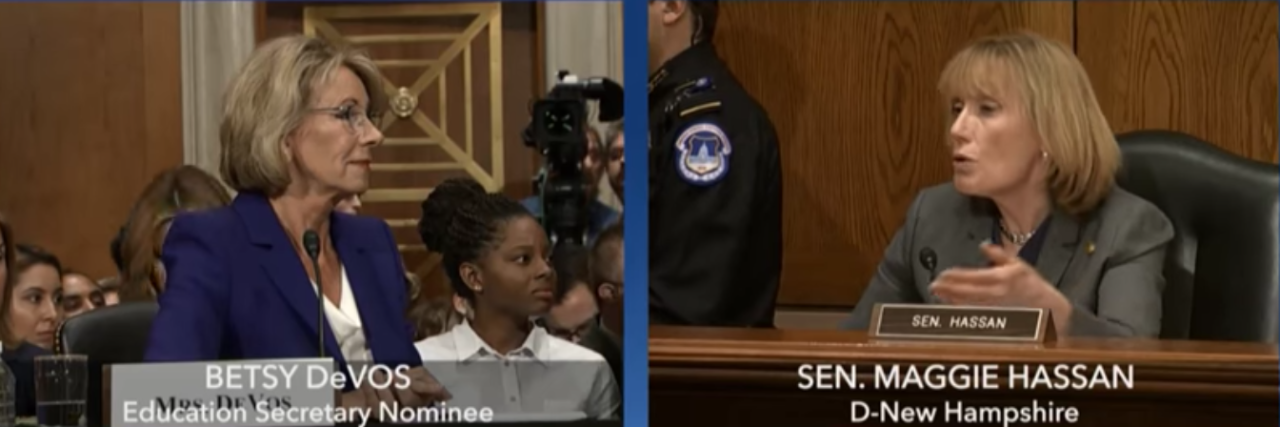Senator, Special Needs Mom Maggie Hassan Questions Betsy DeVos on Protecting Disabled Students
Parents of children with disabilities and special needs are urging one another to call their Congressperson’s office following Tuesday evening’s senate confirmation hearing for Betsy DeVos, President-elect Donald Trump’s pick for Department of Education Secretary. DeVos is a well-known advocate of charter schools – which receive government funding and can be privately owned but operate outside of the public school system – and voucher programs – which give students money to attend private schools – as well as a billionaire whose family, according to DeVos, has possibly donated $200 million to the Republican party.
Concern over DeVos’ appointment comes after questioning from multiple Democratic Senators regarding her knowledge of federal protections for disabled students. Throughout the evening DeVos appeared to be largely unfamiliar with the Individuals with Disabilities Education Act (IDEA), a federal law ensuring special education services to children with disabilities.
When questioned by Sen. Tim Kaine (D-VA), who asked DeVos if she agreed that “…all schools that receive federal funding — public, public charter, private — should be required to meet the conditions [of IDEA],” DeVos said, “I think that is certainly worth discussion.”
Later in the evening, when questioned by Sen. Maggie Hassan (D-NH), whose son has cerebral palsy, DeVos avoided answering whether or not she would enforce IDEA, the nationwide law protecting children with disabilities.
Hassan said:
My son, Ben, experiences very severe physical disabilities. He has cerebral palsy. He can’t speak, he can’t use his fingers for a keyboard. He doesn’t walk, but he is smart and the best kid on earth, if I do say so myself. He got a quality public education at our local school…. And I am concerned that when students who experience disabilities receive a publicly funded voucher to attend a private school, they often don’t receive adequate resources, and in some cases have to sign over their legal rights under the Individuals with Disabilities Education Act. So, do you think that families should have a recourse in the courts if their child’s education does not adequately meet his or her needs, whether it’s at a school where they get a voucher or in a more traditional public school?
After thanking Hassan for her time and question, DeVos replied, “I would advocate for all parents to be able to have that opportunity to choose the right school for their child,” to which Hassan responded:
I had the opportunity to send him to the same public school that my daughter went to because law required that school provide him resources that were never required before that law was passed – because they’re hard. And so the question is, will you enforce the law with regard to kids with disabilities if the voucher program did allow them to go someplace else and the school said, “It’s just too expensive, we don’t want to do it.”
DeVos responded by citing Ohio’s success with its voucher program, to which Hassan interrupted, saying:
Because my time is limited, excuse me for interrupting you. What I am asking you is, there is at least one voucher program in Florida, the McKay voucher program, which makes students sign away their rights before they can get that voucher. I think that is fundamentally wrong, and I think it will mean that students with disabilities cannot use the voucher system that a department under your leadership might start. So I want to know whether you will enforce, and whether you will make sure that children with disabilities do not have to sign away their legal rights in order to get a voucher should the voucher program be developed.
DeVos replied with more statistics, this time regarding Florida’s voucher program, but did not say if she would enforce the existing law.
After moving on from her original line of questioning, Hassan followed up later in the evening, asking, “So were you unaware, what I just asked you about the IDEA, that it is a federal law?”
“I might have confused it,” DeVos replied.
Hassan then explained what IDEA does, following up with her concerns about DeVos’ nomination:
One reason that it is difficult to have this hearing and feel that we fully understand your perspective is because we do know that children with disabilities, in at least some of the voucher programs that you have supported, have gone with a voucher to a school. Because of their disability, [they] had to leave the school. The school keeps the money, and then they go back to public schools, which now have even less resources to deal with them. And many of us see this as the potential for turning our public schools into warehouses for the most challenging kids with disabilities, or other kinds of particular issues, or the kids whose parents can’t afford to make up the difference between the voucher and the cost of private school tuition.
Hassan went on:
I just would urge you to become familiar, should you be nominated, with the Individuals with Disabilities in Education Act. And I do have to say, I’m concerned that you seem so unfamiliar with it, and that you seem to support voucher schools that have not honored, that made students sign away their rights, to make sure that the law is enforced. That is very troubling to me.
DeVos vowed she would be “very sensitive to the needs of special needs students and the policies surrounding that,” prompting Hassan to reply:
And with all due respect, it’s not about sensitivity, although that helps. It’s about being willing to enforce the law, to make sure that my child, and every child, has the same access to public education – high-quality public education. And the reality is, the way the voucher systems that you have supported work, don’t always come out that way, and that’s why it’s something we need to continue to explore.
You can watch the full exchange between Hassan and DeVos below.

